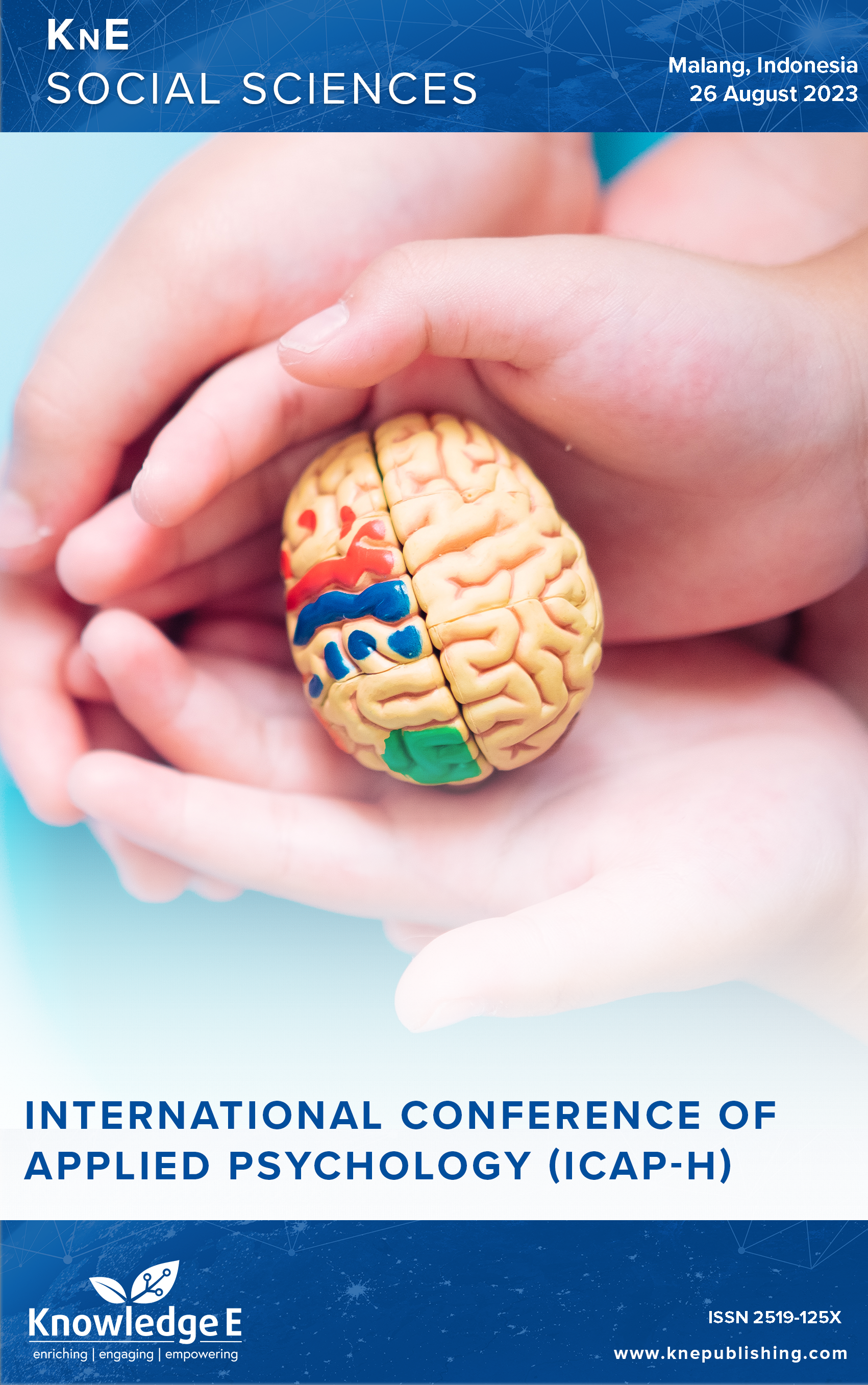Forgiveness in Young Adult Dating Relationships: A Comparative Study Between Javanese and Buginese
DOI:
https://doi.org/10.18502/kss.v9i5.15180Abstract
Erikson stated that the intimacy vs isolation crisis is closely related to an individual’s ability to establish a romantic relationship. Conflict resolution is needed so that the relationship continues to run well. One of the things that can be done is to forgive. This study aims to determine the level of forgiveness in early adult dating relationships between Javanese and Bugis tribes. The study uses quantitative methods with comparative studies. The subjects in this study were Javanese (n = 20) and Bugis (n = 20) people. Data collection in this study used the Heartland Forgiveness Scale which was translated into Indonesian by the researcher. The t-test hypothesis test shows that the results of this study show no difference in the level of forgiveness in dating relationships in young Javanese and Buginese adults. This happens because there are other factors that are more influential than the influence of culture itself such as commitment, closeness and satisfaction with the relationship, emotional control, personal factor, empathy, and religious commitment.
Keywords: Buginese, Javanese, forgiveness, dating relationships
References
Maree JG. The psychosocial development theory of Erik Erikson: critical overview. Early Child Development and Care. 2021;191(7–8):1107–1121. DOI: https://doi.org/10.1080/03004430.2020.1845163
Sohrabi R, Aghapour M, Rostami H. Inclination to forgiveness and marital satisfaction regarding to mediator attachment styles’ Role. Procedia - Social and Behavioral Sciences. 2013;84:1622–1624. DOI: https://doi.org/10.1016/j.sbspro.2013.07.002
Theofani E, Herdiana I. Meningkatkan resiliensi penyintas pelesual melalui terapi pemaafan. Jurnal Ilmiah Psikologi Terapan. 2020;8(1):1–7. https://doi.org/10.22219/jipt.v8i1.9865 DOI: https://doi.org/10.22219/jipt.v8i1.9865
McCullough ME, vanOyen Witvliet C. The psychology of forgiveness. Oxford: The Handbo. New York; 2002. DOI: https://doi.org/10.1093/oso/9780195135336.003.0032
Pariartha NK, AzZahra AC, Anggini CT, Eva N. Peran forgiveness dan dukungan sosial terhadap kesejahteraan psikologis pada perempuan penyintas kekerasan dalam hubungan pacaran. 2022;13(2):130–143.
Suwartono C, Prawasti CY, Mullet E. Effect of culture on forgivingness: A Southern Asia-Western Europe comparison. Personality and Individual Differences. 2007;42(3):513–523. DOI: https://doi.org/10.1016/j.paid.2006.07.027
Thompson LY, Snyder CR, Hoffman L, Michael ST, Rasmussen HN, Billings LS, et al. Dispositional forgiveness of self, others, and situations. Journal of Personality. 2005;73(2):313–359. DOI: https://doi.org/10.1111/j.1467-6494.2005.00311.x
McCullough ME, Worthington EL Jr, Rachal KC, Rachal KC. Interpersonal forgiving in close relationships. Journal of Personality and Social Psychology. 1997;73(2):321– 336. DOI: https://doi.org/10.1037//0022-3514.73.2.321
McCullough ME, Rachal KC, Sandage SJ, Worthington EL Jr, Brown SW, Hight TL. Interpersonal forgiving in close relationships: II. Theoretical elaboration and measurement. Journal of Personality and Social Psychology. 1998;75(6):1586–1603. DOI: https://doi.org/10.1037//0022-3514.75.6.1586
Tam T, Hewstone M, Kenworthy J, Cairns E. Intergroup trust in Northern Ireland. Personality and Social Psychology Bulletin. 2009;35(1):45–59. DOI: https://doi.org/10.1177/0146167208325004
Rinaldi A, Hufad A, Komariah S, Hufad MM, Komariah S, Masdar M. Uang panai sebagai harga diri perempuan suku bugis bone (antara tradisi dan gengsi). Equilib J Pendidik. 2022;10(3):361–373. DOI: https://doi.org/10.26618/equilibrium.v10i3.8411
Prayitno US. Revolusi mental dalam perspektif budaya jawa: Analisis melalui pemikiran pierre bourdieu mental revolution in javanese cultural perspective: The pierre bourdieu’s thinking analysis ujianto singgih prayitno. Aspirasi. 2017;8(2):223– 234. DOI: https://doi.org/10.46807/aspirasi.v8i2.1267
Enright RD, Eastin DL, Golden S, Sarinopoulos I, Freedman S, Enright RD, Eastin DL, Golden S, Sarinopoulos I, Freedman S. Interpersonal forgiveness within the helping professions: An attempt to resolve differences of opinion. Couns Values. 1991;36(2):84–103. DOI: https://doi.org/10.1002/j.2161-007X.1991.tb00966.x
Enright RD. Forgiveness is a choice: A step-by-step process for resolving anger and restoring hope. Washington (DC): American Psychological Association; 2019.
McCullough ME. Forgiveness as human strength: theory, measurement, and links to well-being. Journal of Social and Clinical Psychology. 2000;19(1):43–55. DOI: https://doi.org/10.1521/jscp.2000.19.1.43
Sumargo B. Teknik Sampling. Jakarta Timur: UNJ Press; 2020.
Kusumastuti A, Khoiron AM, Achmadi TA. Metode penelitian kuantitatif. Sleman: CV. Budi Utama; 2020.
Rachmawati I, Faizah, Hasanah N. Hubungan komitmen dengan pemaafan pada.
Worthington EL Jr, Wade NG. The psychology of unforgiveness and forgiveness and implications for clinical practice. Journal of Social and Clinical Psychology. 1999;18(4):385–418. DOI: https://doi.org/10.1521/jscp.1999.18.4.385
Kaleta K, Mróz J. Gender differences in forgiveness and its affective correlates. Journal of Religion and Health. 2022;61(4):2819–2837. DOI: https://doi.org/10.1007/s10943-021-01369-5
Mróz J, Kaleta K, Soltys E. Decision to forgive scale and emotional forgiveness scale in a polish sample. Current Psychology. 2022;41(6):3443–51. DOI: https://doi.org/10.1007/s12144-020-00838-6
Singh AK, Tiwari GK, Rai PK. Understanding the nature and attributes of unforgiveness among females: A thematic analysis. 2022;13(3):4937.
Gall TL, Bilodeau C. The role of forgiveness as a coping response to intimate partner stress. Journal of Spirituality in Mental Health. 2021;23(4):319–341. DOI: https://doi.org/10.1080/19349637.2020.1745725
Suharsono M, Susetyi DP. Karakteristik pemaafan berbasis budaya jawa. Psikodimensia. 2017;16(1):81. DOI: https://doi.org/10.24167/psiko.v16i1.953
Pradana FE, Cahaya GD. Program Asimilasi Pada Masa Pandemi COVID-19: Pendekatan Psikologi Ulayat. Journal of Correctional Issues. 2022;5(1):12–17.
Nashori F, Iskandar TZ, Setiono K, Siswadi AG. Pemaafan pada etnis jawa ditinjau dari faktor demografi. Psikologika: Jurnal Pemikiran dan Penelitian Psikologi. 2013;18(2). DOI: https://doi.org/10.20885/psikologika.vol18.iss2.art2
Bandung AB. Budaya bugis dan persebarannya dalam perspektif antropologi budaya. Lensa Budaya J. Ilm. 2020;15(1):27–36.

